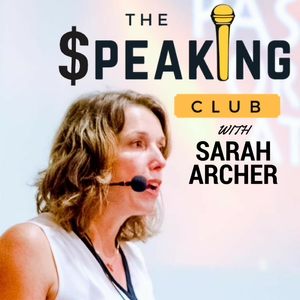
S2E8 - The Best Speech of Your Life
06/13/22 • 33 min
1 Listener
What makes a speech remarkable and memorable? McKay answers this question in today’s episode as he brings to light examples of great speeches and teaches us how to improve our speaking skills. In order to connect with your audience, McKay explains that you have to focus on your audience, prime them to think in the same mindset, use stories to carry them along, and ask questions.
The episode begins with the story of Abraham’s Lincoln speech, a short speech that inspired many and continues to do so to this day. McKay explains how Lincoln makes use of repetition and constraint in his speech and how he recognized his physical surroundings and atmosphere, giving more power to his speech. Mckay gives a step-by-step approach on how to become a better speaker by connecting more fully with your audience and making your speech less about you and more about your listener.
The Finer Details of This Episode:
- Abraham Lincoln’s speech at Gettysburg
- Using repetition and contrast in speeches
- How to become a better speaker
- You have to focus on your audience and connect with them
- The story behind “I Have A Dream”
- Starting your speech by priming the listeners
- The different examples of priming
- Priming with stories and jokes
- The power of asking your audience questions
Quotes:
“Great orators, when giving a speech, seek a cadence, a feeling, by their use of words.”
“Great speaking is a developed talent.”
“Too often, we don't consider the place or the audience. And so many speakers come at it from their own point of view, or make it about themselves. And this gets in the way, it prevents the listeners from fully engaging.”
“Pay attention to where you sit. Sit where you can easily make contact with the listeners. Eye contact makes all the difference. ”
“In the beginning of a presentation, you need to prime the listeners a bit so that they can follow you more intently. Priming brings the listener’s mind into your mindset and gets everyone on the same track.”
“Too often, I hear speakers tell personal stories, and they're focused on sharing the story like an overzealous friend who just returned from vacation and wants to show you their vacation pictures. And they share every single exhausting detail about themselves.”
“Priming is a useful skill in all of your speaking. And when you learn to prime well, you can elevate your effectiveness.”
Show Links:
What makes a speech remarkable and memorable? McKay answers this question in today’s episode as he brings to light examples of great speeches and teaches us how to improve our speaking skills. In order to connect with your audience, McKay explains that you have to focus on your audience, prime them to think in the same mindset, use stories to carry them along, and ask questions.
The episode begins with the story of Abraham’s Lincoln speech, a short speech that inspired many and continues to do so to this day. McKay explains how Lincoln makes use of repetition and constraint in his speech and how he recognized his physical surroundings and atmosphere, giving more power to his speech. Mckay gives a step-by-step approach on how to become a better speaker by connecting more fully with your audience and making your speech less about you and more about your listener.
The Finer Details of This Episode:
- Abraham Lincoln’s speech at Gettysburg
- Using repetition and contrast in speeches
- How to become a better speaker
- You have to focus on your audience and connect with them
- The story behind “I Have A Dream”
- Starting your speech by priming the listeners
- The different examples of priming
- Priming with stories and jokes
- The power of asking your audience questions
Quotes:
“Great orators, when giving a speech, seek a cadence, a feeling, by their use of words.”
“Great speaking is a developed talent.”
“Too often, we don't consider the place or the audience. And so many speakers come at it from their own point of view, or make it about themselves. And this gets in the way, it prevents the listeners from fully engaging.”
“Pay attention to where you sit. Sit where you can easily make contact with the listeners. Eye contact makes all the difference. ”
“In the beginning of a presentation, you need to prime the listeners a bit so that they can follow you more intently. Priming brings the listener’s mind into your mindset and gets everyone on the same track.”
“Too often, I hear speakers tell personal stories, and they're focused on sharing the story like an overzealous friend who just returned from vacation and wants to show you their vacation pictures. And they share every single exhausting detail about themselves.”
“Priming is a useful skill in all of your speaking. And when you learn to prime well, you can elevate your effectiveness.”
Show Links:
Previous Episode

S2E7 - How to Treat a Tick
On today’s episode, McKay talks about how to turn the skeptics and critics in your life to supporters and partners. He shares several principles that can help bring skeptics to your way of thinking. First, approach everything from their frame of reference. Often the smartest person in the room tends to be the quietest one, because they first seek to understand. He goes on to talk about the importance of speaking with authenticity.
McKay shares the experience of Nelson Mandela who used the power of helping others feel validated to prevail in one of the most significant negotiations of all time. McKay then talks of how parents and people can use trust to influence the skeptics and critics in their life. McKay then shares the tactics of Robert Cialdini to develop more influence with people in our life. These tactics include reciprocity, explaining why, contrasting, and social proof. So, put these skills to test when dealing with the skeptics or critics in your life. They will help you win them over to your way of thinking.
The Finer Details of This Episode:
- Shania Twain’s vocal cords infected by ticks
- Ticks as a metaphor for skeptics
- The importance of listening
- Using trust to win over skeptics
- The power of authenticity
- Valuing others’ opinions
- Nelson Mandela’s quest for equality and freedom
- Practicing what you preach
- The rule of reciprocity
Quotes:
“Turning skeptics into believers, and critics into partners can be done. And learning the skill to do that is not only useful in sales and business, but also with kids, spouses, and a host of other people in our life.”
“When I'm talking to a skeptic, I don't always know how to bring them to my side, but after listening often, that way to bring them over is revealed to me. It's in listening that you gain your inspiration of how to persuade them.”
“People who ask questions are often the smartest in the room, because they have the humility to ask about what they don't know.”
“Next, winning the skeptics, critics, or other ticks to your side is a matter of trust. And trust is a function of two characteristics: character and competence. You may have someone with extreme character on your team, but if they're not competent, you don't trust them to do what needs to be done.”
“So answer questions directly and genuinely. And remember, rapport is not enough to bring skeptics to your side.”
“You see, Mandela understood that to get the people with the guns to give up the power, he had to convince them that they would be safe after doing so.”
“When people know why you're building a business or your children understand why there is a rule, they're much more apt to comply.”
“Remember, shut up and listen. Use questions to guide the direction of the discussion but make sure the skeptics and critics feel understood. Then talk to them in their language and from their point of view.”
Links:
Next Episode

S2E9 - Speak So People Listen
This week, McKay talks about how to speak so people listen. He opens up the episode with the story of Ronald Reagan’s powerful speech to D-Day veterans at Pointe du Hoc. Great speakers, McKay says, ask questions to connect with the audience and help them feel like the message is for them. To remember and map their speech, good speakers break their speech down into manageable chunks, each with important points to get across. By using chunks, speakers can teach instead of memorizing their lines verbatim. Most importantly though, McKay holds that the key to speaking so that people listen is knowing your strengths and weaknesses. Then, seek to magnify your strengths. It’s your strengths that make your speaking memorable.
He goes on to note that, when we try to mimic someone else’s style by playing to their strengths instead of our own, we come off as fake. That’s why McKay says it’s so important to share personal stories; the more an audience relates to you, the more they will listen to you. McKay also shares some speech 'don’ts' - such as using too many jokes to too much focus on the speaker. He draws this episode to a close by sending a heartfelt message to his friend Austin who has recently embarked on a public speaking journey of his own and encouraging all of us to learn a bit more how to speak so people listen.
If you like this episode you’ll love
Episode Comments
Generate a badge
Get a badge for your website that links back to this episode
<a href="https://goodpods.com/podcasts/open-your-eyes-with-mckay-christensen-204984/s2e8-the-best-speech-of-your-life-21489184"> <img src="https://storage.googleapis.com/goodpods-images-bucket/badges/generic-badge-1.svg" alt="listen to s2e8 - the best speech of your life on goodpods" style="width: 225px" /> </a>
Copy




